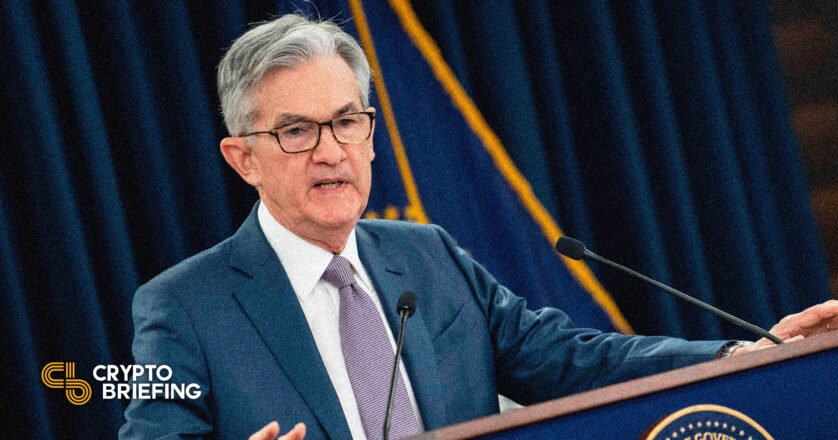Stablecoin Reserves Must Be “Publicly Transparent”: Jerome Powell
The Federal Reserve Chair discussed the role central banks could play in tokenizing finance in Paris.

Key Takeaways
- Federal Reserve Chair Jerome Powell has weighed in on stablecoin regulation.
- Speaking at the Opportunities and Challenges of the Tokenisation of Finance conference, Powell called for new regulation that ensures dollar-pegged stablecoins are redeemable one-to-one for real dollars.
- Powell's comments echo those of U.S. Treasury Secretary Janet Yellen in the wake of the TerraUSD meltdown in May.
Share this article
Jerome Powell, Christine Lagarde, Ravi Menon, and Agustín Carstens shared their thoughts on several topics, including DeFi regulation, stablecoins, and central bank digital currencies.
Fed Chair Talks Stablecoins
The Federal Reserve has weighed in on stablecoin regulation.
Speaking at the Opportunities and Challenges of the Tokenisation of Finance conference in Paris Tuesday, Federal Reserve Chair Jerome Powell joined European Central Bank President Christine Lagarde, Managing Director at the Monetary Authority of Singapore Ravi Menon, and Bank of International Settlements General Manager Agustín Carstens to discuss the role of central banks in the rapidly growing crypto economy.
During the hour-long segment, the group discussed several topics, including DeFi, stablecoins, and central bank digital currencies. However, the prevailing line of the discussion centered around crypto regulation. When asked if private sector stablecoins such as Circle’s USDC or Tether’s USDT should be regulated similarly to current bank deposits and money market funds, Powell agreed that the instruments shared some similarities. However, he added that stablecoins need strict regulation to ensure they are sufficiently backed, citing the general public’s tendency to view stablecoins as dollar equivalents. “[Stablecoin] reserves need to be transparent to the public and they need to consist of the kind of the credit assets that will always be there to fund withdrawals,” he explained.
Powell also shared further insights on central bank digital currencies, saying that a U.S. digital dollar would need to be intermediated, privacy protected, identity verified, and transferrable. However, he added that the Fed had no immediate plans to launch a digital dollar; he explained that any such currency would be subject to approval in Congress and require years of research.
Powell’s comments on stablecoins recall those of Treasury Secretary Janet Yellen when she spoke on the issue of private stablecoin regulation earlier this year. Yellen has called for a stablecoin regulatory framework that ensures dollar-pegged tokens are sufficiently backed by quality collateral such as dollars and dollar equivalents, and that infrastructure is put in place to let stablecoin holders convert their assets back to dollars.
The push for stablecoin regulation comes after multiple incidents caused investors to lose faith in certain dollar-pegged assets. In May, the collapse of the unbacked TerraUSD stablecoin sent shockwaves through the crypto space, wiping out over $40 billion of value in the space of a few days. Shortly after the TerraUSD implosion, confidence in Tether’s USDT stablecoin also waned, causing it to temporarily lose its dollar peg. Fears about the quality of USDT backing resulted in holders paying huge premiums to exchange USDT for USDC, the Circle-issued stablecoin that many market participants perceive as safer than USDT. Tether regained its peg thanks to its guarantee that USDT can be exchanged one-to-one for dollars, which led to billions of dollars worth of successful redemptions.
Still, for many members of the U.S. government, such guarantees are worth little unless the proper legislation is put in place to uphold them. Powell’s comments show an increasing desire to regulate private stablecoins. As such, it looks likely that a comprehensive stablecoin bill will be the first major piece of crypto legislation written into law in the U.S.
Disclosure: At the time of writing this piece, the author owned ETH, BTC, and several other cryptocurrencies.
Share this article
